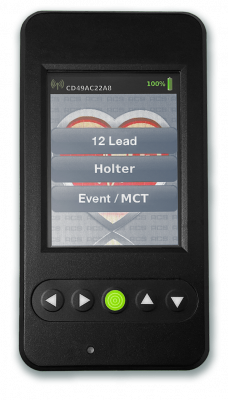Cardiac Monitoring

Four Tests - One Device
- Mobile Cardiac Telemetry
- Event Monitoring
- 12 Lead
- Holter Monitoring
Perform every type of ECG Monitoring with the CORE12 Monitor. ACS Diagnostics has manufactured an advanced four-in-one monitoring device, eliminating the need for gateway device with built in cellular capabilities. The CORE12 Monitor is the only monitor you will ever need.
Cardiac Monitoring Methods
Role Of AECG Monitoring for A-Fib
Atrial Fibrillation (A-Fib) is a complex rhythm that is proven to significantly increase risk for adverse events including heart attack, stroke and it can lead to thromboembolic stroke most commonly from emboli arising from the left atrial appendage…
Holter Monitoring
Holter Monitoring is always the first step in AECG monitoring. Testing via Holter usually is a 24-hour test and tends to capture what most physicians are looking for. ACS Diagnostics is considered the gold standard for AECG monitoring due to our Full-Disclosure approach…
Mobile Cardiac Telemetry
Mobile cardiac telemetry (MCT) monitoring is the most advanced form of AECG monitoring today. Mobile cardiac telemetry monitors are devices that monitor the patient’s ECG in real time. MCT technology automatically detects and automatically transmits cardiac abnormalities via cellular telephone to an external diagnostic laboratory for analysis. Some mobile cardiac telemetry devices have the capability to record continuous ECG while performing analysis in real time. This advancement in cardiac monitoring technology is likely to be the future of AECG monitoring.
3-7 Day Holter
Long term continuous AECG monitoring is a new form of AECG monitoring where the monitor is worn for an extended period of time. Long term continuous ECG monitoring is similar to a Holter Monitor except in a much longer duration. Due to advancements in technology, new cardiac monitoring devices can collect and store up to 7 days of continuous monitoring information. Furthermore, both the CORE and Clip monitors currently available can be worn long term for continuous ECG monitoring. This new long-term design is proving to be a useful tool in detecting arrhythmias such as atrial fibrillation and occult arrhythmias.
Cardiac Event Monitoring
Cardiac Event Monitoring is a standard term used to describe cardiac monitoring over an extended period of time. Cardiac Event Monitoring (also referred to as event monitoring) uses a small recording device that is designed to capture cardiac rhythm abnormalities. Event monitors are generally small in size and record only when a symptom or cardiac event occurs. Event monitors generally do not record continuous ECG data (non-full-disclosure) which is evolving to be a significant technological disadvantage compared to newer monitoring technologies such as mobile cardiac telemetry and long term continuous ECG monitoring.
Implantable Cardiac Monitors
Implantable cardiac monitors (ICM) are the most uncommon form of AECG monitoring. Implantable cardiac monitors are used only in rare cases where arrhythmias are suspected but not capable of being captured using another external form of AECG monitoring. Such cases can include cryptogenic stroke and asymptomatic atrial fibrillation.
